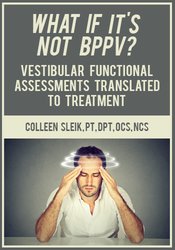

Benign paroxysmal positional vertigo is the most well-known form of dizziness, however there are multiple other conditions that can cause symptoms of dizziness, motion sensitivity imbalance, and falls. This session will introduce multiple vestibular functional assessments that can be used to assess each area of the vestibular rehabilitation program. Findings from these assessments will direct the clinician’s clinical decision-making with regard to appropriate treatment techniques to minimize or eliminate dizziness, decrease risk of falls, and restore function.
NOTE: Tuition includes one free CE Certificate (participant will be able to print the certificate of completion after completing the on-line post-test (80% passing score) and completing the evaluation).
Continuing Education Information: Listed below are the continuing education credit(s) currently available for this non-interactive self-study package. Please note, your state licensing board dictates whether self-study is an acceptable form of continuing education. Please refer to your state rules and regulations. If your profession is not listed, please contact your licensing board to determine your continuing education requirements and check for reciprocal approval. For other credit inquiries not specified below, please contact cepesi@pesi.com or 800-844-8260 before the event.
Materials that are included in this course may include interventions and modalities that are beyond the authorized practice of your profession. As a licensed professional, you are responsible for reviewing the scope of practice, including activities that are defined in law as beyond the boundaries of practice in accordance with and in compliance with your profession's standards.
PESI, Inc. is an approved provider with the Florida Board of Occupational Therapy. Provider Number #50-399. This course qualifies for 1.5 self-study continuing education credits.


PESI, Inc. is recognized by the Physical Therapy Board of California as an approval agency to approve providers. This self-study lecture qualifies for 1.5 continuing competency hours.
This activity is provided by the Texas Board of Physical Therapy Examiners Accredited Provider #2106032TX and meets continuing competence requirements for physical therapist and physical therapist assistant licensure renewal in Texas. This activity will provide 1.5 CCUs. The assignment of Texas PT CCUs does not imply endorsement of specific course content, products, or clinical procedures by TPTA or TBPTE. Full attendance is required; no partial credits will be offered for partial attendance.
This self-study course consists of 1.5 clock hours of instruction that is applicable for physical therapists. CE requirements for physical therapists vary by state/jurisdiction. Please retain the certificate of completion that you receive and use as proof of completion when required.
PESI, Inc. is a Registered Physical Therapy Continuing Education Sponsor through the State of Illinois Department of Financial and Professional Regulation, Division of Professional Regulation. License #: 216.000270. This self-study course qualifies for 1.5 CE credit hours.
PESI, Inc. is recognized by the New York State Education Department, State Board for Physical Therapy as an approved provider for physical therapy and physical therapy assistant continuing education. This self-study course qualifies for 1.9 contact hours.
This self-study activity qualifies for 1.5 continuing education clock hours as required by many national, state and local licensing boards and professional organizations. Save your activity advertisement and certificate of completion, and contact your own board or organization for specific requirements.
| File type | File name | Number of pages | |
|---|---|---|---|
| Manual - What If It's Not BPPV? (2.6 MB) | 42 Pages | Available after Purchase |

Colleen Sleik, PT, DPT, OCS, NCS, is a licensed physical therapist, specializing in the treatment of patients with vestibular disorders when other forms of medical management have failed. Dr. Sleik founded a private practice in 2010 with the primary focus of treating patients with vestibular conditions. She continues to work as a specialist at Dickenson Rehab Services where more than 90% of her caseload consists of patients with vestibular and balance disorders.
Dr. Sleik graduated from The College of St. Catherine with a Master’s in physical therapy. She earned a transitional Doctor of physical therapy degree through The University of St. Augustine, Florida, and completed the Competency-Based Vestibular Rehabilitation course through Emory University in Atlanta, Georgia. In addition to board-certification as an Orthopaedic Clinical Specialist and Neurologic Clinical Specialist, Dr. Sleik is a member of the American Physical Therapy Association, including the Academy of Neurologic Physical Therapists, and the Vestibular Special Interest Group.
She began teaching continuing education courses in vestibular rehabilitation with the purpose of improving clinicians’ knowledge in the specialty of vestibular rehabilitation and ultimately improving the quality of patient care. Dr. Sleik’s goal as a clinician is to provide her patients with the best care available for return to daily function with minimal limitations, while also providing the tools for long-term self-management of symptoms.
Speaker Disclosures:
Visit our FAQ page at www.pesi.com/faq or contact us at www.pesi.com/info
Introduction to vestibular rehabilitation
Discussion of vestibular functional assessments to include:
Discussion of findings from above assessments and how to translate into treatment techniques
Discussion of how to incorporate and progress a treatment plan to address the four areas of a vestibular rehabilitation program:
Review of case study findings for both subjective and objective measures
Discussion of impairments and functional limitations
Translation of assessment findings into treatment
Discuss treatment options to address each of the four components of a vestibular rehabilitation program: gaze stabilization, habituation, balance/gait, endurance
Options for progression of treatment
Satisfaction Guarantee
Your satisfaction is our goal and our guarantee. Concerns should be addressed to: PO Box 1000, Eau Claire, WI 54702-1000 or call 1-800-844-8260.
ADA Needs
We would be happy to accommodate your ADA needs; please call our Customer Service Department for more information at 1-800-844-8260.
PESI Mobile App
Access CE trainings on your phone or tablet through our free mobile app. Choose video or audio-only versions of online courses from the world’s best instructors, and complete your CE requirements anywhere, anytime, at your own pace.
Please wait ...